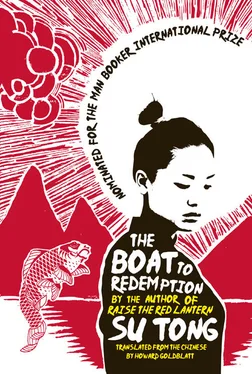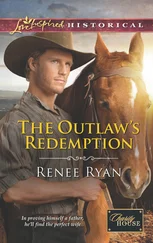Seeing that the child was about to let go, I turned my head so I didn’t have to keep looking at his rear end. Angered by the encounter, I headed towards our stern and muttered, ‘Thump! Thump your goddamned fish! Thump! Thump your goddamned birthmark!’ Just like all the sailors.
My days on the river were unrelievedly lonely, and that loneliness comprised the last thread of my self-respect. There were lots of boys in the fleet, but they were either too old and stupid or too small and disgusting, so I had no friends. How could anyone expect me to make friends with the likes of them? But they were curious about me and as friendly as could be, often dropping by barge number seven to see me, sometimes bringing gifts of mouldy peas or a toy train to tempt me into being their friend. Who did they think I was? I sent them scurrying.
I’m sort of embarrassed to describe my early days aboard the barge. Father wanted me to study, so he started teaching me things I needed to know. He’d let me sit on his favourite sofa as I read from a pile of books that included the notebook that had belonged to my mother; that one I studied on the sly. In recording Father’s lifestyle, Mother seemed to have been in a forgiving mood, since the harshest words she used were ‘did it’. I counted — she used that phrase more than sixty times — Who he ‘did it’ with, when he ‘did it’ with her, as well as where and how many times, plus who initiated it. Had they been caught in the act? As for other details, she settled for thick, heavy exclamation marks and the unhappy comment ‘I could just die, my lungs are about to explode!’
I had nothing to die about as I read what she had written, trying to figure out exactly what had gone on. I wound up wallowing in a space between reason and imagination, and was frightened by the outcome. That outcome was a chemical reaction that made a prisoner of my body — I experienced one erection after another from her words. My crotch was on fire. A shameful flame burned out of control in our cabin, and I didn’t know what to do about it. I closed the notebook, only to have Li Tiemei rekindle the fire from the notebook’s cover. I can’t tell you why, but while there was a look of revolutionary fervour in her eyes, the image of her thin, red lips, her long, straight nose and her soft, titillating ears came across to me as flirtatious. Unable to suppress this imaginary flirtatiousness, I hid the notebook in a chest, an action that settled the upheaval in my groin. But my ears remained unsettled. I thought I sensed a red image on the shore: it was my mother, running along the bank, chasing our barge and shouting angrily, ‘Give me back my notebook! Give it back! Dongliang, you’re shameful and disgusting! If the top beam is crooked, the bottom one can’t be straight. I could just die, Dongliang. Thanks to you, my lungs are about to explode!’
Father was the top beam, I was the bottom one. I couldn’t deny that the top beam controlled the bottom one, but at the same time, I was convinced that being the bottom beam is better than being the top one. It’s easy for the bottom beam to supervise the top beam. I observed Father’s lifestyle with a detached eye, centring observations on his relations with women. But even after prolonged observation, I could draw no clear conclusions. I knew that he was a crooked upper beam, but didn’t know how it was crooked, and in whose direction it bent.
The Sunnyside Fleet was the grudging home of his last few remaining adoring supporters. Even after he was banished to the river, they kept calling him Secretary Ku, and the women in the fleet felt that they bore a responsibility to come to our aid. Qiao Limin, they said, was heartless. With a wave of her hand, she had banished father and son to a river barge. How would they survive with no women aboard? So they brought their feminine sensibilities and a warmhearted nature to barge number seven, often bringing us bowls of noodles or a pot of tea. Desheng’s wife was the kindest of all. On laundry day she’d walk up to the bow of barge number five, carrying her wooden tub like a rice-sprout dancer, and call to my father, ‘Come out here, Secretary Ku. Anything you need to wash? Just toss it in my tub.’
I’d stay in the cabin to watch his reaction. Even if he went out empty-handed, courtesy — which was important to him — demanded that he engage Desheng’s wife in casual conversation. I scrutinized her carefully from inside the cabin, starting with her bare feet, with their ruddy backs and red toenails — obviously painted with balsam oil. All the boat women painted their toes in the hope that people would look at their feet. My father did not disappoint. He’d comment, ‘Desheng’s wife, I detect a look of revolutionary romanticism about you.’
She’d just giggle, missing his point altogether. ‘I spend all my time on this barge,’ she’d say, ‘so stop that nonsense about revolutionary romanticism.’ I knew this praise from him was filled with danger. I was pretty sure he had his eye on Desheng’s wife, and on Sun Ximing’s as well. My guess was, he had his eye on lots of women. With my face up against the porthole, I watched with my heart in my mouth, because the minute he got close to a woman, as soon as the two of them began talking, I’d start to worry and the word ‘thump’ would pop into my head. Based on my experience, I’d send a silent warning: Careful, be careful, don’t get any ideas, keep that thing down . Nervously, I’d glance at his trousers, not daring to breathe. Joyfully, whether he was with Desheng’s wife or Sun Ximing’s, the crotch of Father’s trousers remained as flat as a placid river. He avoided making a fool of himself, and I guessed that his years as an official had taught him that there were two ways of dealing with people — one to their face and another behind their back.
I couldn’t do that. I couldn’t control myself. Once, when he was off to one side chatting with Desheng’s wife, I stuck my head through the porthole to get a good look at them both. Spotting me, Father picked up a bamboo pole and smacked me on the head. ‘What are you looking at, you little sneak? If I tell you to study, you put your head down on your book and sleep. But now your eyes are as big as cowbells!’
I pulled my head back inside, stuck for an excuse. No excuse was possible. An unhealthy adolescence is sewn together by countless unhealthy details. I knew I annoyed people. I was empty-headed, yet weighed down with cares. Someone might assume that nothing bothered me, but I was a sneak. I really was. Father’s so-called lifestyle caused no problems on the river, but mine certainly did. I was burdened with a gaunt exterior and dark moods. That was all Father had to see to know that I had begun masturbating. During the daytime he frequently launched surprise inspections of my hands, even sniffing my palms; at night, when I was in bed, to make sure my hands and crotch were apart, he’d wake me up if necessary to keep my hands on top of the covers.
It didn’t seem fair that while I never bothered him about his lifestyle, he couldn’t stop bothering me about mine. Now that he had lost his leadership position in Milltown, the task of reforming me became his number-one priority. Like a schoolteacher, he transformed our barge into a mobile classroom, starting by cutting out four pieces of red paper and writing a commandment on each of them: UNITY, ANXIETY, SOBRIETY, ENERGY. Then he stuck them up on the cabin walls.
I had no argument with two of his commandments. Anxious? Thanks to all those surprise inspections, I was certainly that. Sober? Day in and day out, nothing good ever happened, and I felt as if the whole world owed me something. But where unity and energy were concerned, all I can say is, I found the former boring, while the latter, though not without its appeal, required certain preconditions. Activities like playing ball or practising with slingshots were things you did on land. I was on the water — how energetic could I be?
Читать дальше












